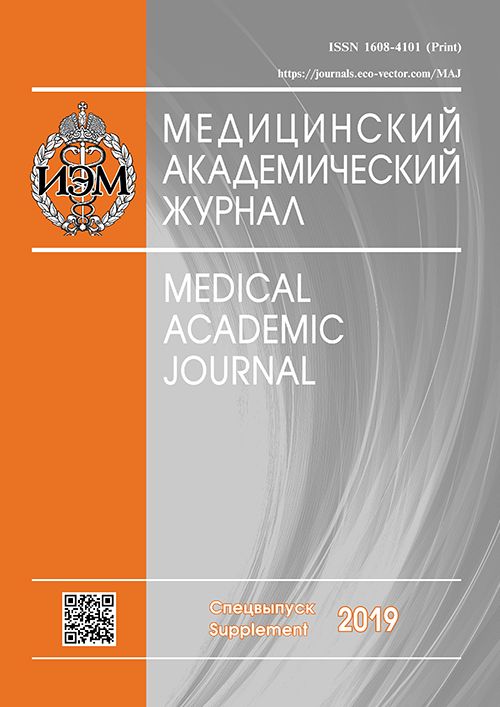MODULATION OF B-LYMPHOCYTES ACTIVITY BY CHOLINOTROPIC DRUGS BEFORE WATER-IMMERSION STRESS
- Authors: Nezhinskaya GI1, Krylova IB1
-
Affiliations:
- Institute of Experimental Medicine, Saint Petersburg
- Issue: Vol 19, No 1S (2019)
- Pages: 209-210
- Section: Articles
- Published: 15.12.2019
- URL: https://journals.eco-vector.com/MAJ/article/view/19401
- ID: 19401
Cite item
Abstract
The aim of the work was to study the effect of modulation of B-lymphocytes activity with cholinotropic drugs on the stomach damage caused by water-immersion stress (WIS). The work was performed on male Wistar rats. Atropine (2 mg/kg), methacin (2 mg/kg) and choline alfoscerat (90 mg/kg) were administered 14 days before the WIS which lasted for 5 hours. The number of antibody-producing cells (APC) in spleen and the content of immunoglobulins IgA, IgG, IgM in blood were determined. The rats injected with saline were served as the control. On day 14 after administration of methacin or choline alfoscerat, but not atropine, an increase in the APC content in the spleen was observed comparing with control. At the same time, there was a significant decrease in the number of gastric ulcers. Thus on the model of water-immersion stress (WIS), it has been shown that B-lymphocytes can serve as a new target for the action of cholinotropic drugs, and modulation of their activity can provide effective prevention against stress.
Full Text
About the authors
G I Nezhinskaya
Institute of Experimental Medicine, Saint Petersburg
I B Krylova
Institute of Experimental Medicine, Saint Petersburg
References
- Mashkovsky MD. Pharmaceuticals. Moscow: Novaya Volna; 2007. 1206 p.
- Nezhinskaya GI, Petrova NN. The role of B-lymphocyte stimulation in the prevention of stress-induced gastric ulcers in Wistar rats. Cytokines and inflammation. 2006;(1):34-36.
- Nezhinskaya GI, Losev NA, Sapronov NS. Effects of cholinergic antagonists under stress. Pat. Fiziol. Experiment. Ter. 2007;(2):12-13.
- Nezhinskaya GI, Vladykin AL, Sapronov NS. Non-neuronal effects of a muscarinic antagonist in the prevention of stress. Experimental. Clinical Pharmacol. 2008;71(3):46-48.
- Sapronov NS, Nezhinskaya GI, Vladykin AL. The role of metabolites of the muscarinic antagonist metacin in the regulation of inflammation. Med. Academ. J. 2009;9(1):28-32.
- White KL, Musgrove DL, Brown RD. The sheep erythrocyte T-dependent antibody response (TDAR). Methods Mol. Biol. 2010;598:173-184.
- Xie Y-F, Jiao Q, Guo Sh, et al. Role of parasympathetic overactivity in water immersion stress-induced gastric mucosal lesion in rat. J. Appl. Physiol. 2005;99:2416-2422.
Supplementary files







